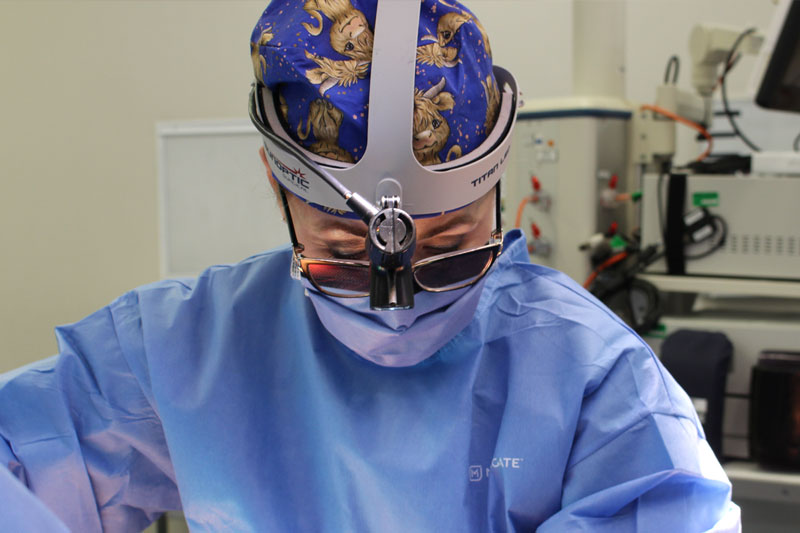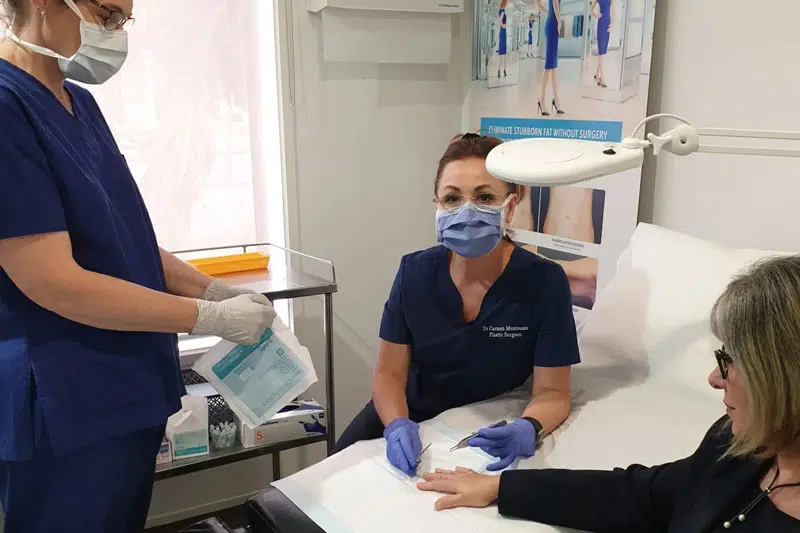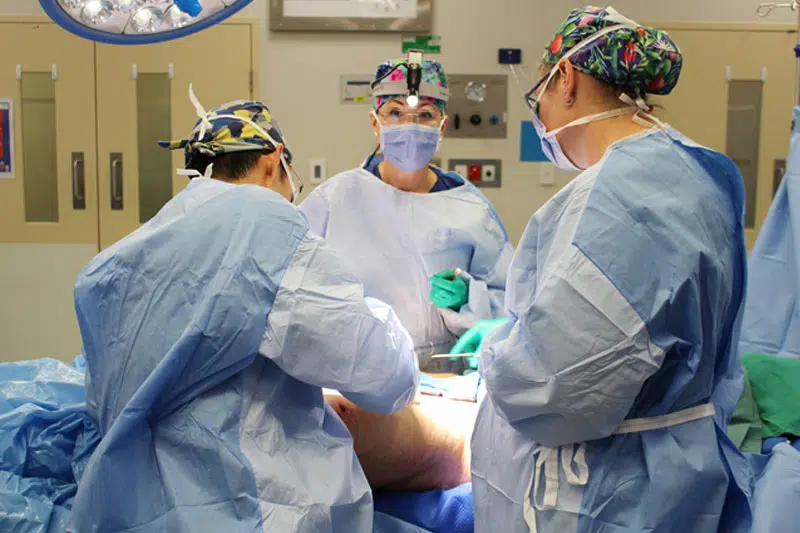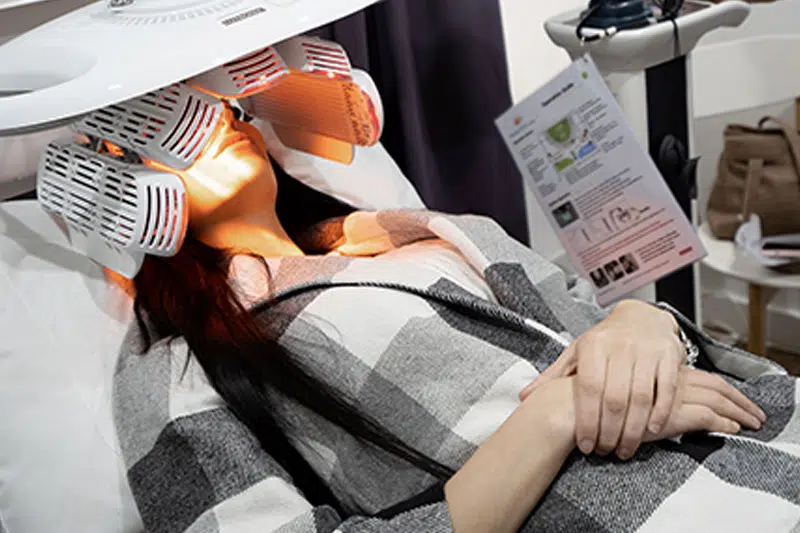What is Breast Implant Replacement Surgery?
There are a number of reasons women seek breast implant replacement with Dr Carmen. Sometimes older breast implants have become hard (called capsular contraction) or they are no longer the right size for the women after changes in weight or pregnancy. Be it an augmentation, a lift, autologous fat transfer, or a reduction, any breast surgery may eventually require revisional surgery for cosmetic or functional reasons. Dr Carmen performs breast revision surgery to help women achieve their desired breast size and shape.
Unfortunately, sometimes revisional surgery may also be required to correct a previous surgery where something went wrong, leaving the patient with a disappointing result. Regardless of your reasons behind seeking a revision breast surgery, it is important to discern whether further surgery is necessary in order to correct the breast placement, or rectify and possibly replace aged or undesired implants.
Revisional breast surgery is a delicate procedure that requires highly detailed knowledge of the procedure which was previously performed.
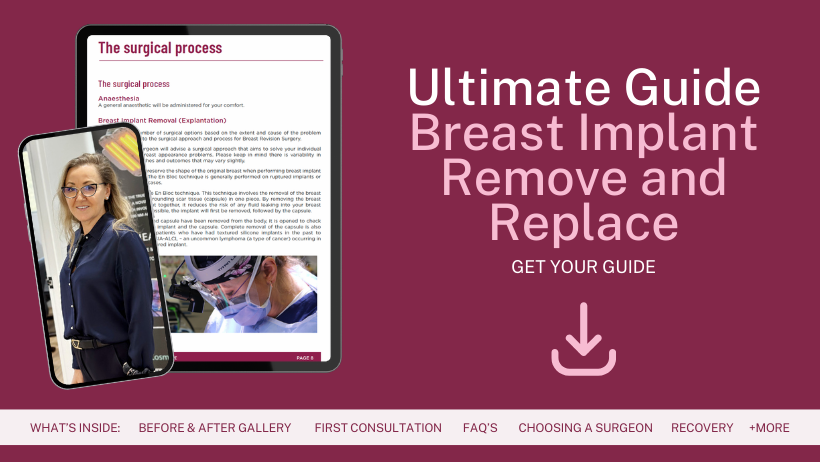
Download Dr Carmen’s Guide to
Breast Implant Remove &
Replace Surgery
Symptoms that can require Breast Implant Replacement Surgery
- Breast Asymmetry– breasts that appear uneven or lopsided
- Bottoming out– the nipple is positioned too high on the breast as the implant has dropped
- Capsular contracture– a complication resulting in hardening of the implant pocket
- Double bubble– a crease across the lower part of the augmented breast
- Implant removal and replacement– replace old implant with a modern one or size change
- Rippling or wrinkling– creasing skin texture usually on top of breast
- Ruptured implant– remove, rectify and possibly replace an implant
- Symmastia– implants too close together crossing the midline
Breast Implant Replacement Before and After photos
You can see photos of Breast Implant Replacement when you visit Dr Carmen’s clinic.
If you would like to see examples of Dr Carmen’s Breast Surgery work visit the photo page.
Changing Your Implant Type or Brand
Are your breast implants getting old? If your breast implants have been in place for some time – or you have a concern – you may want to replace your breast implants with newer types of implants. Some patients even exchange their implants a few years after surgery, because they want to change size or content type.
What is involved with Breast Implant Replacement Surgery?
- Your primary breast augmentation surgery is when you first get implants inserted.
- Any future surgery including replacement or exchange is known as revision surgery or a secondary procedure.
Reasons For Exchanging Implants
- Wanting to change breast size (larger or smaller)
- Changing the type of implant (fill, brand, projection, round vs teardrop)
- Ageing implants – read the lifetime warranty information of a breast implant
- Treating a complication like capsular contracture, rotation or a double bubble
- Needing a revision augmentation to correct for pronounced breast asymmetry
- Wanting to try new, modern options including Motiva implants
- Needing a breast lift to treat ptosis (drooping breasts) after pregnancy or ageing
- Concerns related to sensitivities or allergies
- Rippling where an implant shows visible folds or wrinkles underneath the skin
- Post-surgical scarring
- Pain in the breast area after breast augmentation
Medical Reasons for Breast Implant Exchange
Breast augmentation is an excellent tool for those seeking to improve on the volume and shape of their breast area.
Some women who undergo cosmetic surgery overseas, for instance, may be unhappy with their results and seek to repair implants that have been mishandled or inserted poorly. This is often the result of inadequate medical regulations that do not properly consider the health and welfare of patients, such as performing the procedure in an unsterile environment or being treated by an inexperienced or untrained surgeon. The outcome may be significantly different to what you had envisioned and may result in harmful health conditions or critical effects such as pain, rippling, scarring or breast lumps. Other complications that can be detected from a breast implant check include, but are not limited to:
Capsular Contracture
- As one of the most common complications associated with implants, capsular contracture occurs when the body reacts to the foreign substance by forming scar tissue around the implant. This may cause the implant to harden or fix into place, restraining its natural movement and generating a disfigured, unnatural contour. Capsular contracture can be quite painful and uncomfortable and should be addressed at the earliest sign of complication.
Ruptured Breast Implants
- In some cases, a change of shape or reduction in size may indicate a ruptured implant. The rupture of a saline implant is often noticeable very quickly, but if a silicone implant ruptures, the effect may be slow and difficult to distinguish, which is why routine check-ups are strongly recommended. Ruptures can either be contained within the breast capsule (intracapsular) or can be more dangerous, where the leakage seeps past the capsule and into the breast tissue and body (extracapsular), leading to further health risks.
Implant Malposition or Rotation
- When an implant is positioned incorrectly behind the breast, the result may look distorted. While placing it too high will cause an upper bulge that tips the nipple downward, an overly low insertion will make the upper breast appear empty, prompting the nipple to tilt upward. A mal-positioned implant can be treated by repositioning the device to ensure a secure ratio of volume above and below the nipple level.
All surgery has risks – for detailed information about the risks and potential complications of breast implant replacement please visit the risks of surgery page.
How Can You Check On Your Existing Breast Implants?
- Attend all follow-up visits after surgery including your Annual reviews
- Be sure to schedule these into your diary and keep your surgeon up to date on changes to your contact information (phone, email address)
- Also, stay vigilant about any changes to your breast shape or sensitivity – the same recommendations are for all women even those who do NOT have breast implants
- Alert your surgeon immediately if you have any changes to your breast appearance and/or other concerns
Assessing Your Implant Status:
- Discuss review time frames with your Plastic Surgeon and be sure you attend your surgery reviews
- You may be asked to get a scan at certain points in time, such as MRIs or Ultrasounds
- You can also ask to get your implant surgery details registered on the breast prosthesis database if available in your region
Annual Breast Review By Your Plastic Surgeon
- We recommend your reviews be done with your original Surgeon in your local area, if available
- This can be an issue if you have overseas breast surgery with an unknown doctor
- Avoid having surgery overseas because breast surgery patients tend to lack adequate follow-up care and reviews, or revision options of their breast augmentation results when they have surgery in overseas facilities.
When is the Recommended Time To Replace Your Implants?
The time frame for replacing implants can vary from patient to patient. Typically, you should consider exchanging them at the 9-10 year mark; although not every woman does. Some women have had their implants in place for decades, with no concerns, but there are varying medical opinions about time frames for replacing your implants. As a general guideline, risks of implant deterioration increase as the implants age, so keep this in mind.
- Nothing lasts forever – and that includes breast prosthesis
- Some patients successfully keep their implants in place for decades
- However, most manufacturers recommend a 10-year life (breast prosthesis).
- Research suggests older, ageing breast implants have higher risks of a future complication
- Sometimes new models of implants become available in Australia, this sometimes encourages women to change their older implants for a newer style, model or texture
How Soon Can Implants be Replaced Following Surgery performed Elsewhere?
In most cases at least 6 months following surgery elsewhere. This is because the original doctor is required by law to provide post-operative care and surgery takes time to settle. Dr Carmen also has no insight into how the surgery has been performed, the implants used, and infection control employed. She also does not have full insight into how patients from other clinics have been managed in the post-operative phase.
However, if you remain unhappy about your results after 6 months and have been unable to get an agreed path forward with your original doctor, then we recommend you see your GP for a referral to Dr Carmen.
If you are experiencing a serious complication from surgery elsewhere such as an infection or wound breakdown, you should contact that clinic urgently. You should also consider presenting at emergency or your GP if you are unable to get in contact with that clinic.
Recovery and Aftercare
Following the completion of your breast implant replacement surgery, dressings will be applied to the incisions and a support bra or elastic bandaging can be worn to provide support to the breasts and minimise swelling as you heal. For the first three weeks following your surgery, you should only perform light activities. Most patients should be able to return to work within 7 to 14days. It is normal to experience visible bruising and discomfort for about two weeks following your surgery and swelling should start to subside within three weeks.
Aesthetik profile uses Healite II treatments post-operatively to assist with healing, help reduce swelling and minimisation of surgical scars.
How Much Is Breast Implant Replacement Surgery?
At your initial consultation you will be given a detailed quote which will include, the surgeon’s fee, anaesthetic fee, assistant’s fee and the hospital fees, including theatre and day stay fee.
The fees are inclusive of all postoperative care for the first 6 weeks or however long it takes for the complete healing to occur, if there is a delayed healing circumstance.
A Medicare rebate may be available depending on your circumstances for undertaking breast implant replacement surgery. If so, it will make a big difference if you are privately insured, as the Private Health insurance might pay more of the hospital and theatre expenses. They can sometimes contribute to the expenses for dressings and garments.
With a doctor’s referral you can receive a Medicare rebate for your initial and subsequent consultations. If you have the relevant private health insurance you not only receive the Medicare rebate for your procedure, you may receive an extra rebate from your health fund.
Payment plans are available for some patients. – See the payment plan information
Why Visit Dr Carmen for Breast Implant Replacement Surgery?
- She is a highly qualified female surgeon
- Over 25 years’ experience
- Regularly performs breast procedures
During your pre-operative consultation, Dr Carmen will compassionately address the previous breast surgery and determine which revision technique is necessary to refine the breasts.
Any information about your previous surgery is paramount to understanding the intrinsic details. This includes the type and size of implants, and when the implants were inserted. This will help Dr Carmen produce the highest quality breast correction.


